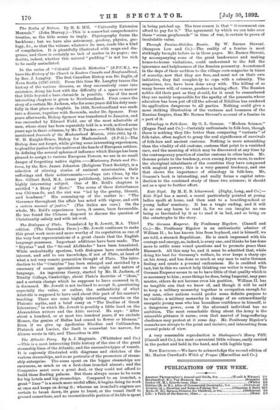The Dialogues of Plato. Translated by B. Jowett, M.A. Third
edition. (The Clarendon Press.) —Mr. Jewett continues to make this great work more and more worthy of its reputation as one of the very best representations of a great classic that the English language possesses. Important additions have been made. The " Eryxias " and the "Second Alcibiades" have been translated. While undoubtedly spurious, both dialogues have considerable interest, and add to our knowledge, if not of Plato, at least of what a not very remote generation thought of Plato. The intro- duction to the " Cratylus " has been enlarged and enriched by a summary of recent speculations on the origin and nature of language. An ingenious theory, started by Mr. H. Jackson, of Trinity College, Cambridge, about Plato's doctrine of "ideas," and a certain change which he supposes to have occurred in it, is discussed. Mr. Jewett is not inclined to accept it, questioning especially the value, or rather, the authenticity of what Aristotle is supposed to have said about this part of his master's teaching. There are some highly interesting remarks on the Platonic myths, and a brief essay on "The Decline of Greek Literature," in which Mr. Jewett is possibly a little hard on the Alexandrian writers and the Attic revival. He says : "After about a hundred, or at most two hundred years, if we exclude Homer, the genius of Hellas had ceased to flower or blossom." Even if we give up Apollonius Rhodius and Callimachus, Plutarch and Lucian, the limit is somewhat too narrow, for Alcsau.s wrote in 620, and Theocritus in 260.


































 Previous page
Previous page